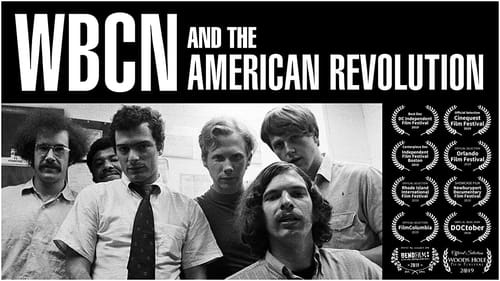
Self (archive footage)
An exploration of the life and career of the Beatles superstar, with a look at the strange parallels between him and his killer Mark David Chapman.

Self (archive footage)
The amazing untold story of the radical underground radio station WBCN-FM set against the profound social, political and cultural changes of the late-1960s and early-70s, using the actual sights, sounds and stories of those who connected through the station, exploding music and countercultural scenes, militant anti-war and civil rights protests and emerging women’s and LGBTQ-liberation movements.

Himself
Ex flower child goes looking for revolutionary hero and finds a brilliant no-quitter with a good appetite.

Self
Celebrities and creatives -- including musician David Byrne, performance artist Spalding Gray, comedian Sandra Bernhard, radical activist Abbie Hoffman, and poet Allen Ginsberg-- recall their earliest sexual experiences.

Self
Filmmaker Morley Markson shows Abbie Hoffman, Jerry Rubin, Allen Ginsberg, Timothy Leary, and other '60s rebels, then and now in a follow up to his 1971 film "Breathing Together: Revolution of the Electric Family."

Self
Abbie Hoffman's first interview after seven years in hiding. My name is Abbie... I am an orphan of America.

Himself
He was the 16-year-old Guru Maharaj Ji and, as the Millennium approached, he promised to levitate the Huston Astrodome. It was the early Seventies and anything was possible so thousands flocked to his gathering. Follow him from his mansion in New York to the limousines in Houston, listen to his followers and watch the spectacle unfold just as TVTV did in this Alfred I. du Pont award wining documentary.

Self
The title of this Canadian documentary may have some relation to Canadian Marshall McLuhan's theories. It combines interview with famous U.S. militants of the '60s, such as Jerry Rubin and Abbie Hoffman, with reenactments of their Chicago trials (i.e., the "Chicago Eight," etc.). Other figures of cultural interest from the time, including Alan Ginsberg and Buckminster Fuller, are interviewed or featured. The filmmaker indicates his belief that powerful forces in the U.S. government worked together to suppress American radicals. This view, widely disbelieved at the time, has since been confirmed.

Himself
In the spring of 1970, thousands of protesters descended on New Haven to demonstrate against the trial of Black Panther members for the murder of suspected FBI informant Alex Rackley. Led by radical luminaries Abbie Hoffman, Jerry Rubin, and Tom Hayden, the demonstrators converged on the New Haven Green to vent their anger and shut Yale down. Yale President Kingman Brewster commissioned a small group of Yale students to document the demonstrations, resulting in this 22-minute black-and-white film.

Policeman (Lawren Order)
In 1969, Taylor Mead complained to his friend artist Wynn Chamberlain that Andy Warhol had never paid him for any of the work he had done for him and Wynn said he would make a film especially for Taylor. Inspired by the banality of 1960's television, Chamberlain wrote and directed Brand X, an 87 minute series of faux television shows spoofing the politics and mass media of the day, complete with commercials for Sex, Sweat, Computer Dating and Peanut Butter. BRAND X follows Taylor Mead through a day in a wacky television studio as he portrays an exercise guru, a talk show host, a veteran returning from the American Civil War, a hospital patient in a soap opera, the President of the United States and a televangelist giving the Nightly Sermon. BRAND X satirizes President Nixon, the Vietnam War, sex, drugs, computers, money and race relations.

Director
The Youth International Party, whose members were commonly called Yippies, was a radically youth-oriented and countercultural revolutionary group opposed to war and the status quo of American culture. Known for using theatrics and humor to advocate social change, several Yippies were notably on trial as the Chicago 7. Primarily consisting of footage from the 1968 Democratic National Convention in Chicago which sparked massive demonstrations that were met by violence and hysteria caused by the police. This film also includes found newsreel footage as well as Pigasus - the pig the Yippies advanced as a candidate for President of the United States.

Himself
The Youth International Party, whose members were commonly called Yippies, was a radically youth-oriented and countercultural revolutionary group opposed to war and the status quo of American culture. Known for using theatrics and humor to advocate social change, several Yippies were notably on trial as the Chicago 7. Primarily consisting of footage from the 1968 Democratic National Convention in Chicago which sparked massive demonstrations that were met by violence and hysteria caused by the police. This film also includes found newsreel footage as well as Pigasus - the pig the Yippies advanced as a candidate for President of the United States.

Self
The husband-and-wife acting team of Julian Beck and Judith Malina heads the cast of the "theatre on film" presentation “Emergency”. Screened at the First International Festival of Women’s Films, 1972.

Himself
A critical yet sympathetic examination of the anti-war movement in New York City, shot in 1968, one year after the Summer of Love. The film traces the development group of activists on the Lower East Side. We see their growth from isolated, alienated individuals to a politically empowered community. Filmed between the protests at the Pentagon and the demonstrations at the Democratic Convention in Chicago, it includes portraits of Abbie Hoffman, editor Paul Krassner, folksinger Phil Ochs and anarchist Tom "Osha" Neumann.













